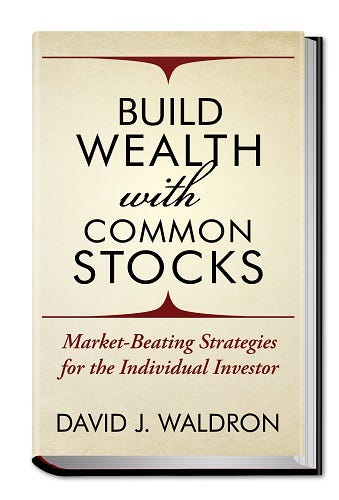
Summary
COST had stagnated on my quality at a reasonable price watchlist for several years as the shares contradict the company’s competitive advantage of bargain-priced consumer goods.
The stock is a market-beating juggernaut contrasted by earnings, free cash flow, and dividend yields that underperform the Ten Year Treasury.
The company nails the fundamentals as well as any, and the downside risks are low, especially for shares accumulated at reasonable prices.
Nonetheless, the asymmetric thesis of an overpriced stock of a quality enterprise requires a disciplined patience level awaiting a more attractive entry price for new investors.
Here’s why QVI maintains its hold rating for COST in the Expanded Portfolio in this updated research report.
Premium (paying) subscribers: When referencing this research report, access your Quality Value Investing (QVI) Glossary of Investing Terms and Metric Targets. Unless noted, all data presented is sourced from Seeking Alpha Premium as of the market close on April 3, 2023, and intended for illustration only.
Costco Wholesale Value Proposition
QVI Research Report’s value proposition section provides a brief synopsis of the company’s business model, major-exchange listing, stock symbol, market capitalization, and dividend-paying status. In addition, it defines the competitive advantages of a company’s products or services to its customers compared to the industry, including the stock’s historical performance vs. the sector and market.
Costco Wholesale Corporation (NASDAQ: COST) is a dividend-paying large-cap stock in the merchandise retail industry of the consumer staples sector. COST was added to the QVI Expanded Portfolio on January 28, 2022, at a split and dividend-adjusted $488.31 a share.
Costco Wholesale Corporation, together with its subsidiaries, operates membership warehouses in the United States, Puerto Rico, Canada, the United Kingdom, Mexico, Japan, Korea, Australia, Spain, France, Iceland, China, and Taiwan. It offers branded and private-label products in a range of merchandise categories.
The company offers sundries, dry groceries, candies, coolers, freezers, liquor, and tobacco and deli products; appliances, electronics, health and beauty aids, hardware, garden and patio products, sporting goods, tires, toys and seasonal products, office supplies, automotive care products, postages, tickets, apparel, small appliances, furniture, domestics, housewares, special order kiosks, and jewelry; and meat, produce, service deli, and bakery products. It also operates pharmacies, opticals, food courts, hearing-aid centers, tire installation centers, and gas stations. In addition, it offers business delivery, travel, same-day grocery, and various other services online in multiple countries.
Costco Wholesale has warehouses in the United States, Puerto Rico, Canada, Mexico, Japan, the United Kingdom, South Korea, Taiwan, Australia, Spain, Iceland, France, and China. It also operates e-commerce websites in the United States, Canada, the United Kingdom, Mexico, South Korea, Taiwan, Japan, and Australia. Costco Wholesale was founded in 1976 and is based in Issaquah, Washington, USA.
QVI’s value proposition elevator pitch for Costco Wholesale:
Costco emanates its brand name by selling inventory at or near cost. However, its membership fees, willingly paid by its loyal members, drive its retail-level profit margin with predictability.
Performance vs. Sector and Market
The chart below illustrates COST’s performance against the Consumer Staples Select Sector SPDR® Fund ETF (NYSE: XLP) and the SPDR® S&P 500 ETF Trust (NYSE: SPY) since QVI’s initial coverage of Costco Wholesale in January 2022.
For example, after outperforming for most of 2022, COST has matched its sector while topping the broader market in total returns during the coverage timeframe. Notably, the stock is up 9.65% year-to-date in 2023 from analyst upgrades despite mixed earnings results.
Due Diligence Resources
For a more in-depth analysis of the all-important value proposition, visit Costco Wholesale’s investor relations webpage and its most recent Form 10-K Annual Report submitted to the U.S. Securities and Exchange Commission or SEC.
QVI’s value proposition rating for Costco Wholesale: Bullish.
COST Total Returns vs. XLP and SPY
Costco Wholesale Corp (COST) Total Return: +1.74%
Consumer Staples Select SPDR ETF (XLP) Total Return: +1.74%
SPDR S&P 500 ETF (SPY) Total Return: -5.50%
Since January 28, 2022 (as of April 3, 2023)COST Shareholder Yields
QVI Research Report’s shareholder yields section uncovers the equity bond rate of the company’s common shares. It aims to quantify the yields on earnings, free cash flow, and dividends to measure how the targeted stock compares to the prevailing yield on the 10-Year Treasury benchmark note.
Earnings and Free Cash Flow Yields
COST’s earnings yield traded well under the targeted floor at 2.74%, as demonstrated in the below chart. Moreover, at 2.48%, COST’s free cash flow yield also traded far beneath the threshold.
As inverse valuation multiples, the earnings and free cash flow yields suggest that COST trades at a premium. QVI will further explore valuation multiples later in this report.
Dividend Yield
Costco Wholesale offers a cursory forward dividend yield of 0.72%, supported by a conservative 26.12% payout ratio, thus indicating a safe dividend rate with room for additional annual increases.
COST yielded 0.74% from an annual payout of $3.60 on a split- and dividend-adjusted cost basis of $488.31 per share on January 28, 2022, the date of QVI’s initial stock coverage. Thus, our yield-on-cost basis was a mere +2 basis points (bps) above the forward yield.
Average of Shareholder Yields
Next, Quality Value Investing takes the average of the three shareholder yields to measure how the stock compares to the prevailing yield of 3.42% on the 10-Year Treasury benchmark note. For example, the average shareholder yield for COST was 1.98% or -144 bps below the 10-Year and 1.99% or -143 bps under the Treasury yield when using QVI’s January 2022 yield-on-cost basis.
QVI’s shareholder yields rating for COST: Bearish.
COST Shareholder Yields
Costco Wholesale Corp (COST) Price: $496.94
Costco Wholesale Corp (COST) Earnings Yield: 2.74%
Costco Wholesale Corp (COST) Free Cash Flow Yield: 2.48%
Costco Wholesale Corp (COST) Dividend Yield: 0.72%
One-Year Trailing (as of April 3, 2023)Costco Wholesale Fundamentals
QVI Research Report’s fundamentals section measures the performance strength of the company’s senior management by analyzing revenue growth, net profit margin, and returns on equity and invested capital.
Revenue Growth and Net Profit Margin
Per the below chart, Costco Wholesale had positive three-year annualized revenue growth of 14.13%, outperforming the 3.61% median growth of the consumer staples sector.
Further down the income statement, Costco Wholesale had a trailing three-year low single-digit net profit margin of 2.55%, underperforming the sector’s median net margin of 3.68%.
Returns on Equity and Invested Capital
Costco Wholesale’s management produced a trailing three-year return on equity or ROE of 29.22%, doubling the targeted threshold and almost tripling the sector’s median ROE of 10.56%.
Stock buyback programs often elevate ROE. For example, Costco Wholesale’s board of directors has reauthorized a stock buyback program of up to $4 billion. The latest program expires in January 2027, replacing the current $4 billion program adopted in 2019, which is scheduled to expire in April.
At 20.64%, Costco Wholesale’s three-year return on invested capital, or ROIC, is above the QVI threshold and trounces the sector’s median ROIC of 6.32%, indicating that its senior executives are outstanding capital allocators.
In addition, Costco Wholesale’s ROIC covers its weighted average cost of capital, or WACC, of 7.88%, adequately. (Source of WACC: GuruFocus).
Despite low retail-level profit margins, Costco Wholesale’s management performance benefits from double-digit positive revenue growth and sector-beating returns on equity and invested capital.
QVI’s fundamentals rating for Costco Wholesale: Bullish.
COST Returns on Management
Costco Wholesale Corp (COST) Revenue (3 Year Growth): 14.12%
Costco Wholesale Corp (COST) Profit margin (3y Median): 2.55%
Costco Wholesale Corp (COST) Return on Equity (3y Median): 29.22%
Costco Wholesale Corp (COST) Return on Invested Capital (3y Median): 20.64%
Three-Year Trailing (as of April 3, 2023)COST Valuation, Risks, and Investment Thesis
Next, QVI dives into the valuation multiples, downside risks, and overall investment thesis of Costco Wholesale Corporation (COST), including potential catalysts. Let’s dig further after reading the required disclosures and background information.
Disclosure: I/we have no beneficial positions through direct ownership of any shares mentioned thus far in this report. I wrote this post myself, and it expresses my own opinions. I am not receiving compensation for it other than from Substack paid subscriptions. I have no business relationship with any company whose stock is mentioned in this article.
Additional disclosure: Quality Value Investing by David J. Waldron’s primary ticker research reports are for informational purposes only. The accuracy of the data cannot be guaranteed. Narrative and analytics are impersonal, i.e., not tailored to individual needs nor intended for portfolio construction beyond his family portfolio, which is presented solely for educational purposes. David is an individual investor and author, not an investment adviser. Readers should always engage in their own research or due diligence and consider (as appropriate) consulting a fee-only certified financial planner, licensed discount broker/dealer, flat fee registered investment adviser, certified public accountant, or specialized attorney before making any investment, income tax, or estate planning decisions.
About the Writer
David J. Waldron is contributing editor of Quality Value Investing and author of the international-selling book, Build Wealth with Common Stocks: Market-Beating Strategies for the Individual Investor. David’s mission is to inspire the achievement of his readers’ financial goals and dreams. He received a Bachelor of Science in business studies as a Garden State Scholar at Stockton University and completed The Practice of Management Program at Brown University. David and his wife, Suzan, reside in historic South Central Pennsylvania, USA.
Preview David’s Book
Readers can preview Build Wealth with Common Stocks here: https://davidjwaldron.com/build-wealth-with-common-stocks.html, including links to over 25 online booksellers worldwide.
Bonus: Founding Members of QVI on Substack are eligible to receive an author-personalized complimentary copy of the case laminate hardcover edition of the book.
Keep reading with a 7-day free trial
Subscribe to Quality Value Investing to keep reading this post and get 7 days of free access to the full post archives.





